
*
"I've always felt there are only two kinds of music," Jonathan Schwartz says. "The good and the bad. Whether it's classical music, country music, every kind of music — there's just the good and the bad."
Schwartz is 72 now, and he has been presenting his idea of good music — jazz, pop, Big Band, Broadway, sometimes even rock — what he calls the American Songbook, the music that has helped shape our country and our lives, on New York radio for more than 40 years. He is also a novelist, memoirist and short story writer, and his mix of music, interviews and comment — anecdotes, stories of his life and career, tales of the many celebrities he has known, from Jackie Robinson to Frank Sinatra — attracts rapt and loyal audiences.
He is heard on WNYC-FM (93.9 FM) in New York on Saturdays and Sundays from noon to 4 PM; his Sunday show emanates from Sirius XM Satellite Radio; and his "High Standards" program is broadcast daily from noon to 3 PM on Sirius XM's Siriusly Sinatra station. He is also known to expound rhapsodically and lovingly on the Boston Red Sox, a baseball passion that dates to his childhood.
Schwartz is a son of Arthur Schwartz (1900-84), the composer of such classic songs as "Dancing in the Dark," "You and the Night and the Music" and "That's Entertainment," and a prime contributor (with such collaborators as Dorothy Fields and Howard Dietz) to the American Songbook — as Jonathan defines it, "music written primarily between the 1920s and the early 1960s," with contributions from post-Golden Age disciples (think Stephen Sondheim, Adam Guettel, John Bucchino, John Pizzarelli and more). "It's the music of real craft and lyrics," he says. It "consists of songs of heart and beauty, written by people who knew what they were doing. They just didn't decide they were songwriters. They worked at it. They studied." The music, he says, "has sweepingly beautiful melodies. No one had heard anything like them — anything at all!"
| |
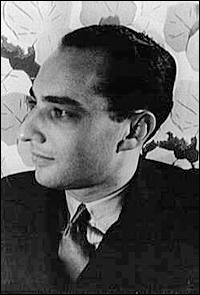 |
|
| Arthur Schwartz |
"About 50 people wrote the American Songbook," he declares, and about 50 people presented it — "a total of 100 who celebrated and performed that music. You can take argument with me about those figures, and I wouldn't blame you, but to me it's kind of true."
Who are those folk? Well, think Richard Rodgers and Cole Porter and Jerome Kern and Lorenz Hart and Oscar Hammerstein II and George and Ira Gershwin and Yip Harburg and Betty Comden and Irving Berlin. And, as we said, Dietz and Fields and Jonathan's father. And (singer-wise) Sinatra and Bing Crosby and Ella Fitzgerald and Fred Astaire and Rosemary Clooney and — well, you get the idea.
These 100 composers, lyricists and singers came out of "their own backgrounds, to create a new form of music," Schwartz says. The composers and lyricists "sprang from the loins of Victor Herbert and Sigmund Romberg and Rudolf Friml and began to write really good popular songs. Irving Berlin, obviously. They just sprung alive as if by magic, as if by wizardry. My father — whose father, Solomon Samson Schwartz, came from Russia — studied to be a lawyer, passed the bar and was a practicing lawyer for four years. But he wanted to write songs. Why? Because of Richard Rodgers." His father, he says, "found himself in awe" of Rodgers.
And in the end, Jonathan says, "it all comes down to Rodgers; he's the most played composer of any kind who ever lived." Tonight, "somewhere on Earth, someone is watching a company of The King and I."
| |
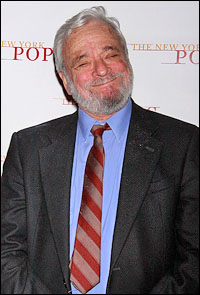 |
|
| Stephen Sondheim | ||
| photo by Joseph Marzullo/WENN |
He acknowledges that "everything began to deteriorate in the 1970s. There is no melody. You can't hear the lyric." But then his voice becomes certain. "It's not endangered," he declares. "There are new boots on the ground. And they number close to 75 or 100 — folks like John Pizzarelli and Jessica Molaskey and Diana Krall, even Michael Bublé. Some of them are writing their own songs. Those songs have been informed by the wisdom of [Stephen] Sondheim. They can address issues that Dorothy Fields couldn't. The American Songbook will simply go on, but be slightly altered and improved."
Sondheim, he says, has indeed been a savior — and a revolutionary. "What he did was to invade the American Songbook with deeper feelings than existed there before. He was able to inoculate the songs with far deeper feelings that we all have had, but that were missing from the American Songbook — feelings that might have been too risky to admit by some of the earlier songwriters. Sammy Cahn wasn't going to write 'Being Alive.' "
When Schwartz was 6, living in California, his father was producing the movie "Cover Girl," with Rita Hayworth and Gene Kelly, and his parents would hold parties for the Hollywood aristocracy. Jonathan would lie in bed listening to the partygoers downstairs. One night a guest came up to sing him a lullaby. The guest was Judy Garland, and the song was "Over the Rainbow."
"It wasn't particularly unusual for me, because these people were around a lot," he recalls. "There was a special thing about Judy, though, because she was the center of 'The Wizard of Oz,' which was one of the first movies I saw. I was very glad she came upstairs."
| |
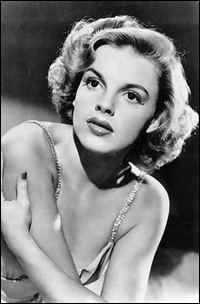 |
|
| Judy Garland |
As Schwartz described it in his 2004 memoir, "All in Good Time," he would use the Baby-Sitter as a microphone, placing it next to his record player, and announce and discuss his favorite music — Jo Stafford, Frankie Laine, Nat "King" Cole. He gave his station the call letters WKCS, using the initials of his mother, Katherine Carrington Schwartz. Neighbors in the building could pick up his voice; he even found out that the signal reached across the street.
He attributes his conversational style to his reaction to the radio announcers he heard in his youth. "When I was very young I was devoted to the radio," he says. "Radio meant everything to me. And I thought there was something wrong with the people who presented the music. I didn't know quite what it was, and then as I got older I realized they were false. They were unctuous and unpersuasive. They were not being themselves while presenting classical or popular music." They were playing "the music of the streets of the time — the young Sinatra, the 1940s Bing Crosby, Big Band hits — and I found the announcers annoying because I didn't believe what they were saying."
When he began working on the radio, he says, "I did my very best to be precisely as I'm speaking to you now, to be true to the music in that way. I felt the music deserved the attention of someone who was real, exactly as he was off the air, no duplicity. There was a companionship between the music and the people who presented it."
| |
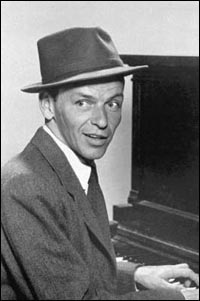 |
|
| Frank Sinatra |
During the week, he has a list. "But on Saturdays and Sundays, when I come into the station, I make it up as I go along. I think about it driving downtown. There might be a particular occasion, something that happened during the week, that I want to address — someone has died, or it's someone's birthday, a composer I might want to start with, and then I go from there." On Sundays, "we have something called a Dalet," a radio automation system, "that has 16,000 titles and performances, and I have that in front of me."
Schwartz is a renowned expert on Sinatra — he seems to know every note of every recording, the changes, large or small, in different recorded versions of the same song. There's even a separate section of Schwartz's programs devoted to the master. It has also been noted that Sinatra felt that Schwartz knew more about his music than even Ol' Blue Eyes did.
"He said so himself," Schwartz recalls. "On the stage of Carnegie Hall. I was there."
Why Sinatra? "He was the best I ever heard. Easily the most honest I ever heard. The most rhythmic I've ever heard. He sang what I thought." Schwartz still feels this way, he says, even though he once got into a big dispute with his idol. In 1980, Schwartz called one of Sinatra's records — the third disk of the "Trilogy" album — a "shambles of self regard." A furious — and powerful and influential — Sinatra called the owner of the station and arranged for Schwartz to be put on "sabbatical," temporarily separated from his microphone, for a couple of months. (A listening-public uproar on Schwartz's behalf helped limit the exile.)
"His way of apologizing for that," Schwartz says, "was introducing me at Carnegie Hall seven years later, saying that this man knows more about me than I do myself, and asking me to stand up and turn around — 'let 'em see you.' I was in the third row. It was my constituency, and I got a huge ovation. When I sat down, he said, and I quote, 'Don't mess with Jonno, I'm tellin' ya.' "
| |
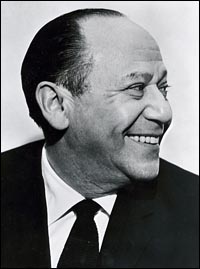 |
|
| Frank Loesser |
Jonathan and his half-brother, Paul Schwartz, a conductor and composer, control their father's creative estate, "but primarily I let Paul do it," Jonathan says. If they get a request from a producer to use the catalog for a musical, he says, "I just send it off to Paul." Some years ago there were two long-forgotten Off-Broadway revues of his father's music, he says, "but they were lousy; they closed quickly." There was also a San Diego tryout of a new theatrical version of the M-G-M-inspired The Band Wagon — "I knew it was there, but I don't really follow this stuff."
On his radio shows, Schwartz doesn't avoid more modern pop — the Beatles, Joni Mitchell, Paul Simon, Neil Young and others. In part, this is a heritage of his beginnings at WNEW-FM in 1967, in the turbulent 1960s, when his radio focus was on those stars as well as the Rolling Stones, the Doors, the Mamas and Papas, Bob Dylan and Judy Collins, the cutting edge of those years.
But it's also that he thinks some of these performers "have been able to gain entry into the American Songbook." He says, "Simon's 'Still Crazy After All These Years' comes to mind. A lot of Joni Mitchell. They expand the American Songbook. And if you don't expand it, it won't breathe. There are tremendously gifted musicians who write songs and perform them. Pizzarelli and Molaskey are just remarkable."
Schwartz was also a cabaret performer, singing and playing the piano in nightclubs like Michael's Pub for 11 years. But he gave that up in 1988. "My audience ran out," he says. "I only played in this area. I don't like the word Ramada." He stills sings around the house. "My wife" — the actress Zohra Lampert — "thinks I'm quite the singer, but at age 72 I know I'm not quite the singer."
| |
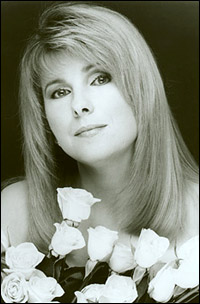 |
|
| Nancy LaMott |
There's one crucial topic in his life that Schwartz hasn't touched on: His love for the Red Sox. The obvious question is, why would a boy growing up in Beverly Hills and Manhattan latch onto the Sox? Well, the answer has to do in part with the theatre.
"My father had a show called Park Avenue (it was a major flop), that he wrote with Ira Gershwin. The show played Boston, and I was brought there. The 1946 World Series was between the Cardinals and the Red Sox, and I was taken to see a game. When I walked into Fenway Park, I thought I had walked into heaven."
In addition, he says, the Red Sox had the only player who didn't have a roommate on the road — the legendary Ted Williams. "I didn't have a roommate. I had no brother or sister at the time. So I identified with Ted Williams."
With the new baseball season in swing, how does he think the Red Sox will do? "They acquired two major all-stars over the winter, Adrian Gonzalez and Carl Crawford," he says. In his voice, there is at least as much excitement about the American League race — maybe a touch more — as he has displayed discussing the American Songbook. At this moment, Gonzalez and Crawford might possibly be as important to him as Rodgers and Hammerstein.
"The Red Sox have the best pitching staff," he says. So if they don't have too many injuries, "they have a significant chance of winning the World Series."
Whatever happens to the Red Sox, it's clear that if there were a World Series for radio announcers, Jonathan Schwartz would be a perennial champion.










